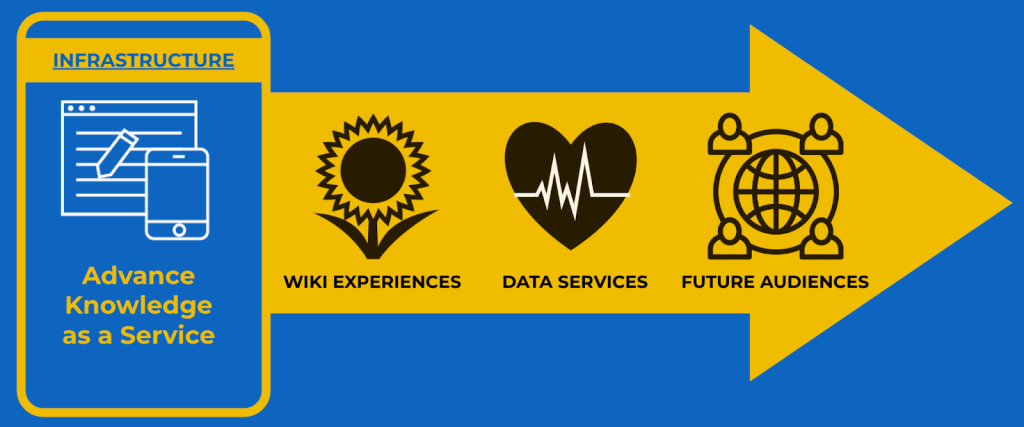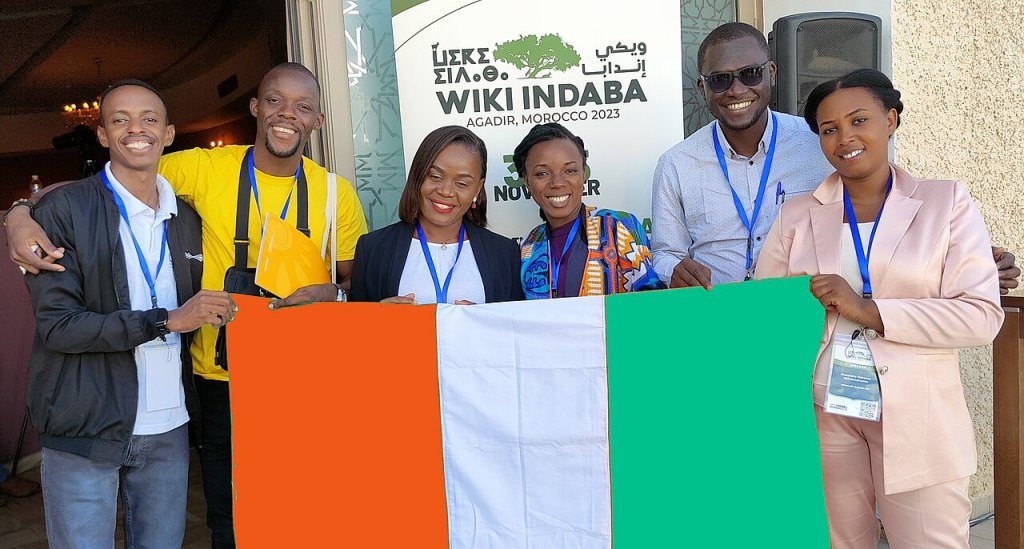
As discussed in the January 2024 post about our progress on the 2023-2024 Annual Plan goals, we have centered this year’s goals around our Product and Technology work, in service of the broader movement strategy goals to advance equity as part of the 2030 Strategic Direction. Our annual plan recognizes Wikimedia’s role as a platform for people to contribute on a massive scale, and prioritizes four key goals to meaningfully evolve the work we do and meet the changing world around us. Hundreds of Wikimedians shaped this annual plan both on and off wiki.
Let us check in on how things have progressed since our last update.
The four key annual plan goals
The annual plan laid out these four key goals:
- INFRASTRUCTURE: Advance Knowledge as a Service. Improve User Experience on the wikis, especially for established editors. Strengthen metrics and reporting.
- EQUITY: Support Knowledge Equity. Strengthen Equity in Decision-Making via Movement governance and Movement Charter. Empower and engage the Movement, support regional strategies and help close knowledge gaps.
- SAFETY & INCLUSION: Protect against growing external threats. Defend our people and projects against disinformation and harmful government regulation. Work across the Movement to Provide for the Safety of Volunteers.
- EFFECTIVENESS: Strengthen our overall performance. Evaluate, Iterate, and Adapt our processes for maximum impact with more limited resources.
Here’s a summary of the Foundation’s progress, broken down by these four goals.
Infrastructure
Our Infrastructure goal is about improving the user experience on the Wikimedia projects. This goal forms the largest portion of the Foundation’s budget, highlighting our focus on product and technology. The bulk of the work so far has been focused on the first of three categories, or “buckets,” called Wiki Experiences. The purpose of this bucket is to efficiently deliver, improve and innovate on wiki experiences that enable the distribution of free knowledge world-wide. We do this by building on our core technology and capabilities, ensuring we continuously improve the experience of volunteer editors, editors with extended rights, and technical contributors, and creating a great experience for our readers.
Wikipedia is one of the most visited websites in the world; and regularly recognized as one of the fastest sites. This is because of our investment in infrastructure around the world to meet the demands from readers and contributors. We know that for knowledge to be useful, it must be easily and rapidly accessible from anywhere, at anytime. As the demand for our content and complexity of that content increases, so too does the demand on our server infrastructure. In addition to the ongoing work to improve our existing data centers around the world, we have recently deployed a new set of servers to a data center in South America. The availability of this new data center will improve speeds and overall efficiency for contributors and readers from South America.
In an age of generative AI services like ChatGPT, the Foundation has introduced new experiments to help us learn more about generative AI is impacting how people seek out knowledge content. To help us further our understanding, we launched in August 2023 a ChapGPT plugin experiment. The plugin was built as a way for ChatGPT users to query Wikipedia explicitly and directly. The experiment concluded in January 2024, and showed that chatbots are not supplanting Wikipedia as a source for knowledge. There is increased trust in the content provided when the information is coming from Wikipedia. We are taking these learnings and beginning work on a new browser extension, which will utilize generative AI and Wikimedia content, to allow readers to use Wikipedia to verify the accuracy of information they read across the internet. This new browser extension will help readers find additional information and reliable sources from Wikipedia about content they discover on other websites.
Recently, we expanded our work to enable a new Wikimedia community for building an open library of functions, Wikifunctions, that is capable of creating new forms of knowledge across Wikimedia sites. Officially launched in August 2023, Wikifunctions is a Wikimedia project to collaboratively create and maintain a library of code functions to support the Wikimedia projects and beyond, in the world’s natural and programming languages. A “function” is a sequence of programming instructions that makes a calculation based on data you provide. Functions can answer questions, such as how many days have passed between two dates, or the distance between two cities. You can find out more on the main Abstract Wikipedia project page on Meta-Wiki.

Our Product and Technology teams also worked to continue to lower the barriers to entry for new code contributors, and have already seen a 20% increase over last fiscal year in the number of volunteer code contributors who submit more than five patches. The teams also made progress on a number of requests for new or improved features, including:
- Temporary Accounts for Unregistered Editors: Previously known as the IP Masking project, this effort will provide greater anonymity to volunteers making contributions without a registered account.
- Discussion Tools: A set of features that improve the usability and effectiveness of the talk pages used to facilitate discussions and decision making on all of the Wikimedia projects.
- Automoderator: Allows volunteer content moderators to configure automated prevention or reversion of bad edits based on scoring from a machine learning model.
- Community Configuration: Provides local on-wiki configuration tools for leaders of individual wikis to customize their wiki’s usage of tools developed by the Foundation’s Growth team. This is designed to help wikis reach and welcome more new contributors with tools such as the newcomer tasks feature.
- Accessibility for reading: Prototyping of a new feature which allows individual readers to select font-related settings – such as size and spacing – which best accommodate their reading needs or preferences.
- Virtual domains: This improvement to our databases setup allows for multiple wikis to have easier access to data shared between many wikis – such as account information.
Equity
Equity is about closing knowledge gaps and supporting and growing a global movement of contributors and content on the Wikimedia projects.
To further our engagement with the numerous Wikimedia communities around the world, we launched Talking: 2024: conversations to share, listen, and learn with intention as we continue to plan our future. So far, Wikimedia Foundation Trustees, executives, and staff have hosted 130 conversations on-wiki, with individuals, and in small groups. Highlights included the need to continue focusing the Foundation on supporting product/technology needs, ‘Human-led, tech-enabled’ means that the humans still lead, can our financial model provide more certainty, and also force difficult trade-offs and that movement roles need more clarity. You can still take part in Talking: 2024 through the project’s Meta-Wiki page.
We have also been working to support regional strategies and increase our ability to connect directly with volunteers from different backgrounds, cultures, and languages. We have partnered with movement affiliates to co-create shared discussion spaces such as WikiCauserie, Afrika Baraza, CEE Catch Up, and more.
Let’s take a closer look at one of these discussion spaces. In early 2023, the Afrika Baraza was established as a forum for African Wikimedians to gather and discuss the challenges and problems faced by the Wikimedia Communities in Africa. Each quarter, Wikimedians from around Africa join Wikimedia Foundation staff to brainstorm and plan solutions to problems facing the region or improvements to existing efforts, such as the Wiki Indaba Conference. This forum has played a crucial role in the development of the Africa Agenda. The Africa Agenda aims to unite the goals that the continent wishes to address, offering a systematic approach to dealing with the issues closing the participation gap in the Sub Saharan Africa region.
The Foundation is also working to close thematic content gaps in too often overlooked topics. Our Open the Knowledge Journalism Awards helped raise awareness of the need for reliable sources in Africa, and recognized six journalists in the region for their outstanding while prioritizing diversity, equity and inclusion in their reporting. The most recent WikiWomen Camp developed a declaration seeking to close the gender gap in project leadership roles, community resourcing, and movement policies. With support from UNESCO and the British Library, Wikisource Loves Manuscripts was able to digitize 28,000 new pages of potential sources on hard to find topics.

Safety and Inclusion
The Foundation’s safety and inclusion work revolves around defending our people and projects against disinformation and harmful government regulation, and providing for the safety of volunteers. As the political and human rights landscape continues to rapidly evolve in the world around us, the work of our Legal, Trust & Safety, and Human Rights teams has evolved to keep pace.
In December, we filed an amicus brief with the U.S. Supreme Court supporting challenges to social media laws in Texas and Florida, and informing the Court about how those laws threaten community-governed free and open knowledge projects like Wikipedia. We also engaged the UK regulator Ofcom to influence enforcement of the Online Safety Act and educate European regulators about the Wikimedia model.
With a number of high-profile national elections taking place in numerous countries, multiple teams across the organization have been organizing and preparing our efforts to combat disinformation. To help inform a wider audience on the potential harm and lessons to take from disinformation, our Trust & Safety team launched a Disinformation 101 course on learn.wiki.
Our communities are an integral part of our efforts in addressing potential safety concerns and increasing inclusion of new and larger audiences. In October, staff supported the publishing of the report on the Foundation’s Affiliates Strategy, which will help guide both staff and volunteer groups in how we collaborate on our work together. The Committee Support team ran successful appointment processes for a diverse slate of candidates to the community-based Affiliations Committee, Ombuds Commission, and Case Review Committee.
Effectiveness
The Effectiveness goal is about improving how we as an organization operate and scale. This year, we are already on track to increase the percentage of our budget that goes to directly supporting Wikimedia’s mission. In concrete terms, this means that, through increasing our internal efficiency around administrative and fundraising costs, we will enable an additional investment of $1.8M into funding for things like grants, feature development, site infrastructure and more.
Effectiveness in communication is also important for an organization serving communities which collectively speak hundreds of languages. Increasingly over the past few years, we have been working to develop a new system for providing translations of core Foundation documentation and communications available in more languages. Within just the previous fiscal year, more than 650 requests for translations were processed within the Foundation using this evolving system. Over the past couple of years, the number of languages supported by the initiative has increased from its inaugural six languages in written translations, to thirty-four languages in written translations and nine languages in verbal interpreting. As an added benefit, the translations are provided by known members of the Wikimedia community – whose experience and knowledge of the movement provides much higher quality translations.
Evaluating progress
We will continue to measure our impact on these four goals through four key metrics, which you can learn more about and read the most recent published results on Meta-Wiki. We are constantly feeding our data back into the process, iterating based on what we’ve been successful at impacting and what we haven’t. We look forward to reporting on more progress throughout the rest of the year.

Can you help us translate this article?
In order for this article to reach as many people as possible we would like your help. Can you translate this article to get the message out?
Start translation